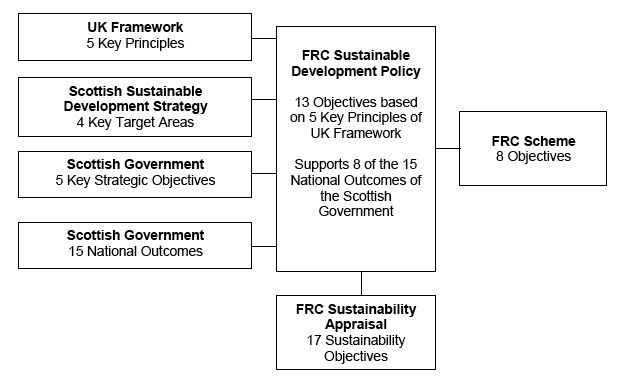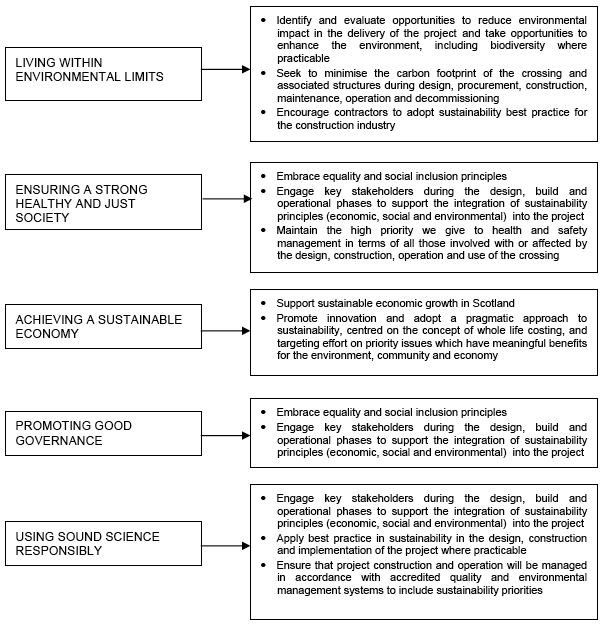2 Policy Context for Undertaking Sustainability Appraisal
2 Policy Context for Undertaking Sustainability Appraisal
This section outlines the policy context for the appraisal of sustainability. The relationship between the FRC sustainability policy objectives and UK and National Objectives are shown in Figure 1:
Figure 1: Relationship between UK/ National Objectives and FRC Objectives for Sustainability

2.2 UK Framework for Sustainable Development
In 2005, Scotland signed up to the UK-shared framework for sustainable development, One future - different paths (DEFRA 2005a), and this framework set out a common goal for sustainable development across the UK:
"To enable all people throughout the world to satisfy their basic needs and enjoy a better quality of life without compromising the quality of life of future generations".
The framework commits the Scottish Government to promoting a clear understanding of, and commitment to, sustainable development in all that it does so that everyone can contribute to the overall goal.
The UK Framework sets out five key principles for delivering sustainable development:
- living within environmental limits;
- ensuring a strong, healthy and just society;
- achieving a sustainable economy;
- promoting good governance; and
- using sound science responsibly.
2.3 Scottish Sustainable Development Strategy and Objectives
Following the UK Framework, the Scottish Executive (now Scottish Government) published "Choosing Our Future" (Scottish Executive 2005) which sets out Scotland’s sustainable development strategy based on the five principles of the UK Framework and outlining at a high level what the government, with others, would try to achieve in Scotland. The strategy encompasses four key target areas:
- the well-being of Scotland’s
people;
- supporting thriving communities;
- Scotland’s global contribution; and
- protecting Scotland’s natural heritage and resources.
These target areas have helped to shape the more recent Scottish Government Strategic Objectives and associated national outcomes (Scottish Government 2008b) providing the policy framework within which the FRC project should operate. The Scottish Government’s five key Strategic Objectives are:
- wealthier and fairer - enable businesses
and people to increase their wealth and more people to share fairly
in that wealth;
- safer and stronger - help local communities to flourish, becoming stronger, safer place to live, offering improved opportunities and a better quality of life;
- smarter - expand opportunities for Scots to succeed from nurture through to life long learning ensuring higher and more widely shared achievements;
- greener - improve Scotland's natural and built environment and the sustainable use and enjoyment of it; and
- healthier - help people to sustain and improve their health, especially in disadvantaged communities, ensuring better, local and faster access to health care.
2.4 Transport Scotland’s Aspirations for Sustainable Development
2.4.1 Sustainable Development
Transport Scotland is committed to promoting sustainability within all its future projects. This will contribute to the achievement of the Scottish Government’s overall purpose of achieving sustainable economic growth and the delivery of the five key Strategic Objectives (refer to Section 2.3).
Transport Scotland aims to deliver sustainability throughout all of its operations and is currently undertaking a sustainability review across the whole organisation with a view to building it into the agency’s project delivery cycle.
This sustainability appraisal for the FRC will provide a foundation for Transport Scotland to build upon for the future development of sustainability within its scope of work.
A Sustainable Development Policy was developed for the FRC project (refer to Appendix 1) in an iterative way. The foundations for the policy were developed during a team workshop involving key staff members from Transport Scotland and its consultants Jacobs Arup and Natural Capital.
The Policy was then formulated in an iterative way with the Project Board and in parallel consultations were held with the Sustainable Development Commission and the Equality and Human Rights Commission.
Once finalised and approved by the Project Board the Policy was published and circulated for information to members of the Environmental Reference Group, including representatives from the Scottish Environment Protection Agency, Scottish Natural Heritage, Historic Scotland, Marine Scotland and the Local Authorities.
Figure 2 demonstrates how the FRC Sustainable Development Policy harmonises with the five key principles that underpin Scotland’s sustainable development strategy.
Figure 2: Correlation between FRC Sustainable Development Policy and the Five Shared Principles in the UK’s Shared Framework
Five Key Shared Principles FRC Sustainable Development Policy Objectives

Fifteen national outcomes have been identified by the Scottish Government that are closely linked with the strategic objectives outlined in Section 2.3. The outcomes describe what the Scottish Government would like to achieve over the next ten years. The FRC policy supports eight of the 15 national outcomes:
- we realise our full economic potential with more and better employment opportunities for our people;
- we live in well-designed, sustainable places where we are able to access the amenities and services we need;
- we have strong, resilient and supportive communities where people take responsibility for their own actions and how they affect others;
- we value and enjoy our built and natural environment and protect it and enhance it for future generations;
- we take pride in a strong, fair and inclusive national identity;
- we reduce the local and global environmental impact of our consumption and production.
- we have tackled the significant inequalities in Scottish society; and
- our public services are high quality, continually improving, efficient and responsive to local people’s needs.
2.4.2 Climate Change
The Climate Change (Scotland) Act, 2009 (Scottish Government (2009b) sets targets for the reduction of greenhouse gas emissions and places a climate change related duty on public bodies. The Act also includes provisions for mitigation of and adaptation to climate change. The new climate change duty requires that public bodies must, in exercising their functions, act:
- in a way best calculated to contribute to the delivery of the targets;
- in a way best calculated to deliver any statutory adaptation programme; and
- in a way that it considers most sustainable.
Transport Scotland will exercise its duties in relation to the FRC scheme in a way that it considers is most sustainable, including the requirements of the Climate Change Act.